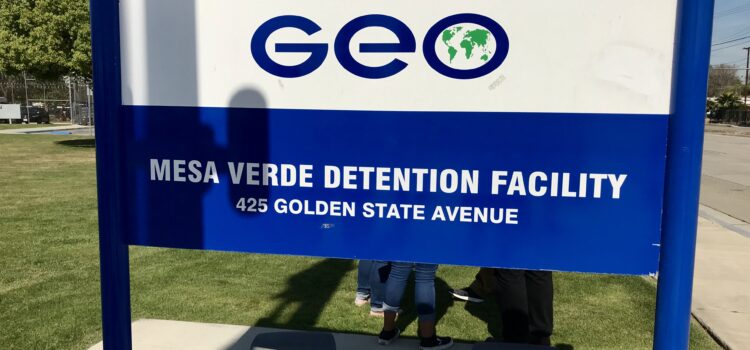
After nearly three and a half hours of debate between residents, immigrant rights advocates, GEO employees, and elected officials, the McFarland City Council voted at Thursday’s city council meeting to approve permits that will allow The GEO Group, Inc. to turn two state prisons in McFarland to immigration detention centers.
The City Council’s 4-0 vote overturned the McFarland Planning Commission’s vote in February that denied GEO’s permit requests. Councilman Stephen McFarland recused himself from the vote. Each immigration detention center will hold 700 detainees.
“Our nation is grappling with COVID-19, and our local government should be taking action to protect [residents],” said Rosa Lopez, a member of the Rapid Response Network of Kern. “We urge you to not to rush through a vote that puts private prisons over community interests.”
Because the meeting was held through teleconference, there was a cap of 100 people who could join the meeting. Advocates urged the city council to postpone the meeting to a time when all residents could partake.
“I’m getting quite a bit of messages from community members who are trying to log into the call, but the meeting has reached the maximum 100 people,” said Alex Gonzalez, a community organizer for Faith in the Valley. “We suggest the meeting be postponed until we have a democratic process, and people can participate.”
However, the council denied that request.
“Even if tonight’s city council meeting was a regular meeting, we would not be able to hold 100 people,” said McFarland Mayor Sally Gonzalez. “We have given you more people that can attend.”
Councilman Rafael Melendez questioned why the city was rushing to vote on the appeal, since all residents couldn’t participate in the meeting.
“I just want everyone to have an opportunity to be heard,” he said. “Why the urgency?”
Larry Pennell, the interim city manger, said it was an urgent matter driven by the “dire” financial condition of the city.
According to Pennell, the immigration detention centers will generate $500,000 in mitigation fees and $50,000 to police and fire support. If the city did not approve the permits, Pennell said McFarland would lose $36 million in local payroll and $500,000 in property taxes.
GEO Group Senior Vice President David Venturella said the detention centers would bring 420 jobs to McFarland. He also promised if there was a unanimous vote by the city council, GEO will reward $1,000 scholarships to all McFarland High seniors, once the detention centers open and every year following for as long as the facilities are open.
But for some, the scholarship money doesn’t mean much.
Aurora Castaneda received a scholarship from GEO after she graduated from high school and said she would gladly give the money back if that meant the denial of GEO.
“I would gladly give that money back to protect our families,” she said. “The majority of the population is Hispanic. That means each one of us most likely knows someone who is undocumented. We will all be affected.”
The city council received more than 800 written comments submitted to them before the meetings. During the meeting, there were a number of people who spoke in opposition of GEO operating to facilities in McFarland.
“I am upset by what you are all doing here tonight,” said McFarland resident Alejandra Figueroa. “Especially taking into consideration of this virus.”
Despite these comments, Pennell said opponents have yet to offer the city council solutions to the financial crisis McFarland faces.
“Let’s allow these out of town protesters to return to their cities, while we try to save ours,” Pennell said. “I recommend you vote in favor of this appeal.”
Many advocates refuted Pennell’s claim, saying there have been other opportunities to help the city financially.
“I feel compelled to speak out on this narrative I have heard,” said Andy Levine, the deputy director of Faith in the Valley. “I wanted to speak on the real outsiders, corporations like GEO from Florida that have no interest in our community as real outsiders. The Central Valley still serves as playground for outside money interest to use our valley, land, people to exploit and profit off it.”
While the majority of the public comments were in opposition of GEO, some residents said GEO will be good for the city.
“I want to thank the city council for listening,” said Javier Lopez. “It’s hard to hear people say we don’t need police and street security. It’s probably because they don’t live here. You are going to make a very important decision. You are either going to be heroes and villains.”
According to the City council, McFarland Police Department only has five police officers.
Daniel Newikki, a GEO employee of GEO, said their only purpose is to see people resolve their immigration cases.
“We are very proud of how we treat our detainees. We are very humane,” she said. “If GEO doesn’t operate here, it’s going to benefit some other community.”
Thursday’s vote comes just two weeks after the City Council appointed Eric Rodriguez, former GEO Group, Inc. employee, to fill a vacancy on the council. Rodriguez voted to second both motions.
Although the McFarland City Council had till May 11 to fill the council vacancy, there was no deadline on holding an appeal hearing in response to GEO’s request.
The residents of McFarland and immigrant rights advocates urged the city council to postpone the appeal hearing to a time when the public can safely gather to take part in the meeting, just as residents did in February.
When the Planning Commission denied the request for permits in February, hundreds of people in opposition of GEO protested outside. Two months later, residents were only able to take part over Zoom or phone call.
Although residents were able to tune in virtually, advocates said limitations still existed in the processing, making it hard for residents to participate in the meetings.
This story will be updated.